Full blast plus 5 Семестровий тест 1(Сімейне навчання)
Choose the odd word./Оберіть зайве слово.
Choose the odd word./Оберіть зайве слово.
Choose the odd word./Оберіть зайве слово.
Choose the odd word./Оберіть зайве слово.
Choose the odd word./Оберіть зайве слово.
Choose the odd word./Оберіть зайве слово.
Complete the sentence with the correct word./Доповніть речення правильним словом.
I’ve got a nice _____ on the wall.
Complete the sentence with the correct word./Доповніть речення правильним словом.
Do you play a musical _______?
Complete the sentence with the correct word./Доповніть речення правильним словом.
My aunt is a ______ at a restaurant.
Complete the sentence with the correct word./Доповніть речення правильним словом.
Fred doesn’t help with the housework. He’s very ______.
Complete the sentence with the correct word./Доповніть речення правильним словом.
When do you ______ out with your friends?
Complete the sentence with the correct word./Доповніть речення правильним словом.
Look at that parrot. Its ______ are blue and yellow.
Choose the correct answer./Оберіть правильну відповідь.
Has your brother got a bike?
Choose the correct answer./Оберіть правильну відповідь.
What’s the time?
Complete the dialog with Who or What./Доповніть діалог словом Who або What.
A: _____ do you do after school?
B: I play computer games.
Complete the dialog with Where or When./Доповніть діалог словом Where or When.
A: _____ is the bank?
B: Near the bookshop.
Choose the correct variant./Оберіть правильний варіант.
Jake lives in my neighbourhood. Do you know ______?
Choose the correct variant./Оберіть правильний варіант.
What do you do _____ weekdays?
Choose the correct variant./Оберіть правильний варіант.
The theatre is ______ the bookshop and the art gallery.
Complete the sentence with the correct form of the verb be./Доповніть речення правильною формою дієслова be.
My father _____ a singer and my mother _____ a teacher.
Complete the sentence with the correct form of the verb be./Доповніть речення правильною формою дієслова be.
Mark and I _____ classmates.
Complete with the Present Simple of the verb in brackets./ Доповніть речення правильною формою дієслова в Present Simple.
Alex (ride) his bike in the park every afternoon.
Complete with the Present Simple of the verb in brackets./ Доповніть речення правильною формою дієслова в Present Simple.
My parents (not get) up early on Saturdays.
Make the plural form of the noun./Поставте іменник у форму множини.
Look at that dog! It’s got big (tooth)!
Make the plural form of the noun./Поставте іменник у форму множини.
My cousins have got three (bike).
Choose the correct form of the verb have got./Оберіть правильну форму дієслова have got.
Paul _______ two brothers and a sister.
Choose the correct form of the verb have got./Оберіть правильну форму дієслова have got.
Mary ______ a cat. She hates cats.
Прочитайте текст. Оберіть правильні твердження.
Cookies from Around the World
Cookies (or biscuits, as the Brits call them) are everyone's favourite snack. Usually made from the simple base of flour, sugar and oil, cookies are customized and made absolutely delicious by adding chocolate chips, nuts or raisins.
They can be found everywhere – prepacked at a local supermarket, homemade, in a local bakery, bought at a vending machine or brought in by someone at school or work. With such immense cookie diversity, it is hard to pick your favorite, and each country has its own special cookie tradition!
A Brief History of Cookies
It is believed that cookies originate from Persia. Once sugar became commonly used in the region in the 7th century, Persians found a way to mix it with other available ingredients and bake it.
When the Muslim forces began their conquest of Spain in the 8th century, they also spread the idea of cookies. Some centuries later, cookies were a part of the regular diet in the whole of Europe among all levels of society – including kings and queens as well as peasants.
Because of their delicious taste and caloric value, cookies became a travel companion of many people who began to explore other parts of the world. Made from nuts, sugar and water, a cookie called jumble was among the first ones to become known on every continent.
The American word "cookie" derives from the Dutch language and their word "koekje", meaning "little cake". The Americans adopted it through the Dutch settlement of America in the 1600s.
Прослухайте аудіозапис, оберіть правильні твердження https://www.youtube.com/watch?v=zKsTiYjDwO4
There's ____ carrot, _____ tomato and _______ onions in the basket.

Створюйте онлайн-тести
для контролю знань і залучення учнів
до активної роботи у класі та вдома

















